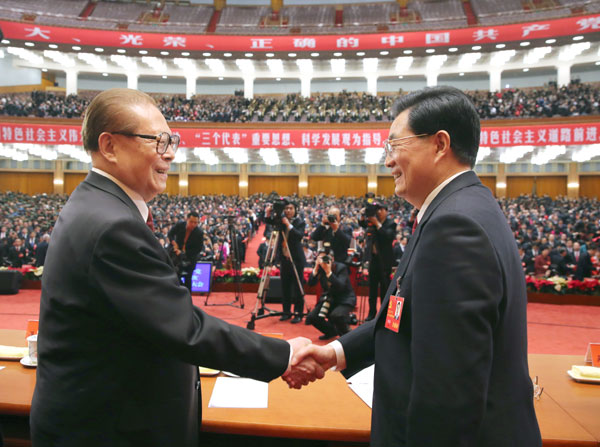Amendment fine-tunes nation's growth trajectory
Updated: 2012-11-15 03:59The Communist Party of China amended its Constitution on Wednesday to make the Scientific Outlook on Development part of its long-term action guide to address new challenges faced by the world's second-largest economy.
Unanimously agreed by delegates to the 18th CPC National Congress, the amendment juxtaposes the Scientific Outlook on Development along with Marxism-Leninism, Mao Zedong Thought, Deng Xiaoping Theory and the important thought of Three Represents, according to a resolution passed by the Party congress.
Analysts said that the inclusion of the Scientific Outlook on Development means that the Party Constitution addresses the country's development needs in the current stage.
 |
|
President Hu Jintao and his predecessor Jiang Zemin shake hands as the 18th Party Congress concluded on Wednesday in Beijing. HUA YOU / FOR CHINA DAILY |
It also shows the leadership's determination to pursue balanced development, experts said.
It is an action guide that the Party should adhere to in the long-term, said the resolution.
The Scientific Outlook on Development advocates sustainable and efficient economic and social development instead of breakneck growth at the expense of the environment and society.
Duan Peijun, a scholar of strategy studies at the Party School of the CPC Central Committee, said the guidance provided by the Scientific Outlook on Development will be conducive in shifting the nation from its current low-efficiency mode of development.
"It's a milestone in Party history and a major theoretical innovation that fits the current social and economic situation in China," said Wang Weiguang, a renowned sociologist and a delegate to the Party Congress.
Wang said the Scientific Outlook on Development enriches the Party's theories.
Serving as the basic law for the CPC, the Constitution has the highest authority within the Party and supreme binding power on all of its 82 million members.
Since the current constitution was endorsed in 1982, the Party has made six revisions in accordance with the country's changing situation.
The Scientific Outlook on Development was first put forward in October 2003, to facilitate overall, coordinated and sustainable development.
Despite the country's three decades of double-digit growth that have made it the world's second-largest economy, China now faces environmental and social challenges, including energy shortages, a widening income gap and corruption.
By elevating the Scientific Outlook on Development to the CPC's action guide, analysts said the world's largest political party will be able to not only ensure the country's sustainable development, but also contribute to global growth.
Sumathi Dharmawardena, secretary-general of the Sri Lanka-China Friendship Association, said that the decisions made at the congress have laid a solid foundation for the country's socioeconomic development, and made contributions to regional and global stability and development.
Another noteworthy amendment to the Constitution is the detailed explanation on the strategic position of ecological progress in China's overall development plans.
"Ensuring ecological progress and building a beautiful China are new concepts in our Party's Constitution. It sends a message that our Party gives high priority to people's interests," said Xia Xueluan, a renowned sociologist at Peking University.
Guy Alois Magnus, head of the Brussels-based Environment and Public Health Office of the European Society for Research and Prevention on Environment and Health, said ecological awareness is extremely important.
China will have to carefully monitor the environmental impact of its economic activity and promote this internationally, Magnus said.
Contact the writers at wujiao@chinadaily.com.cn and fujing@chinadaily.com.cn
Deng Zhangyu and Xinhua contributed to this story.


